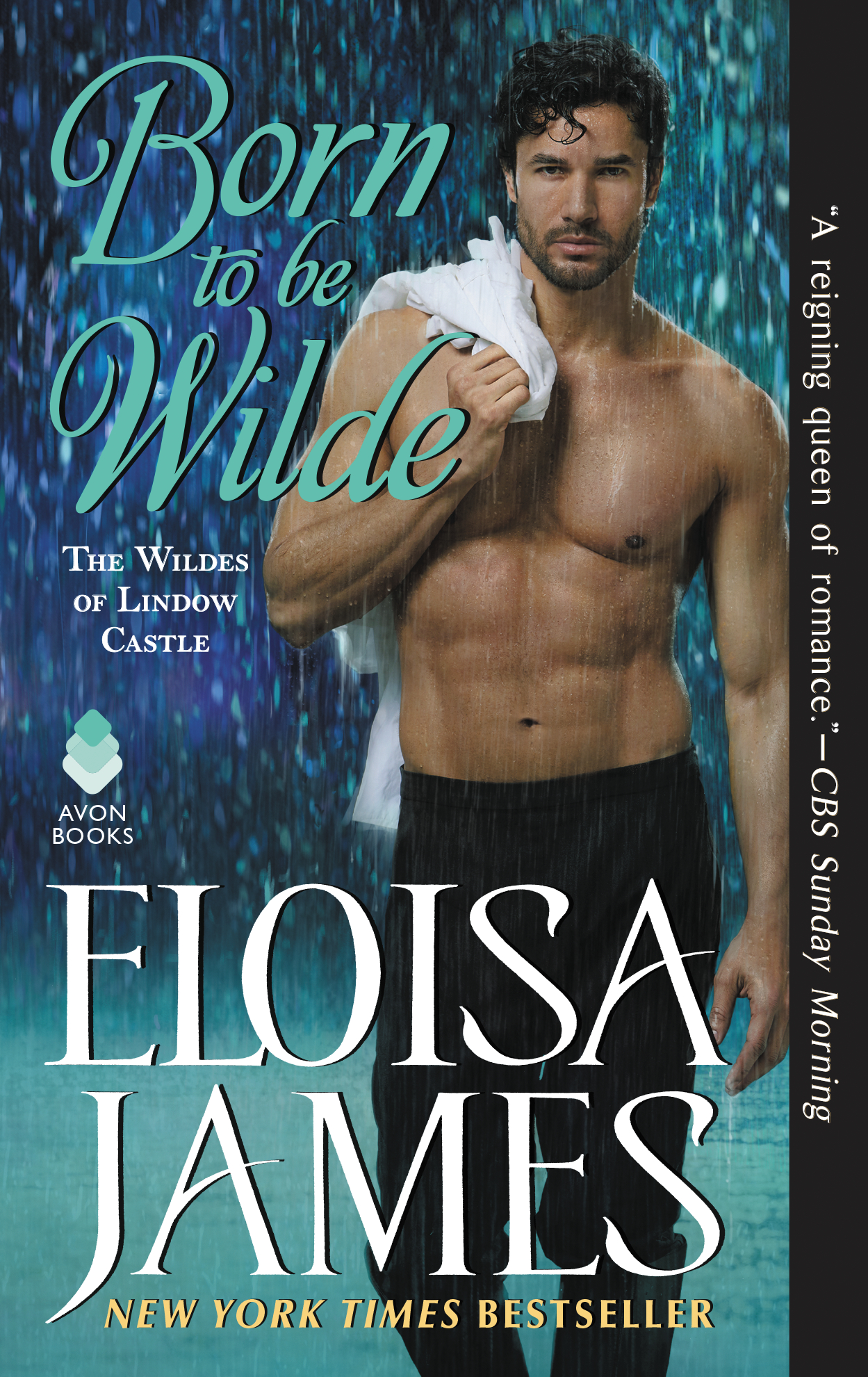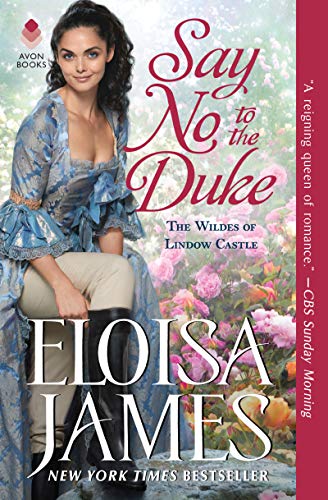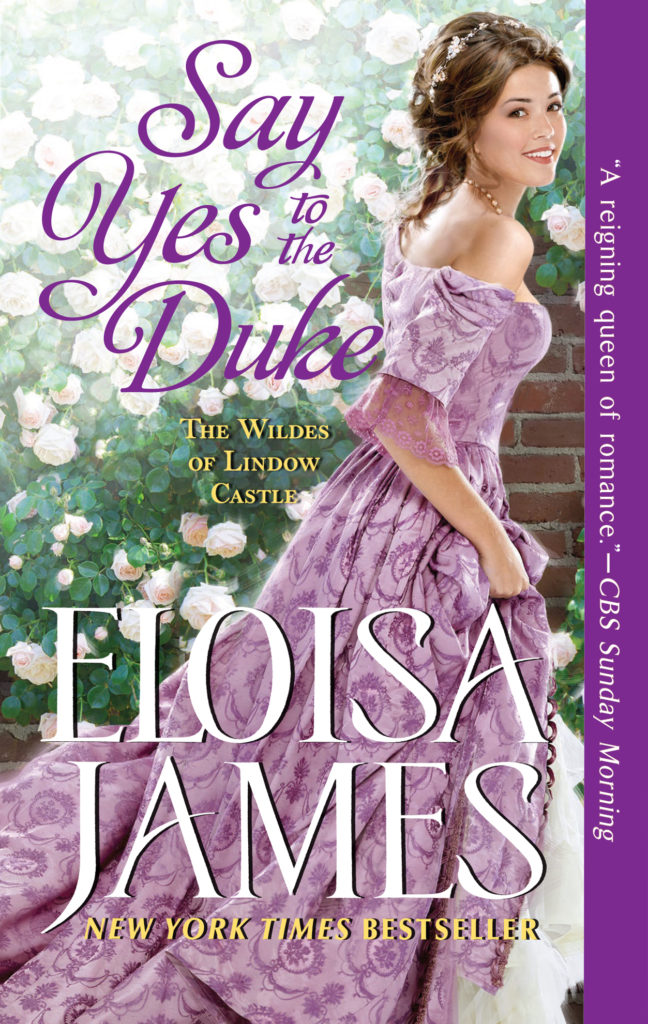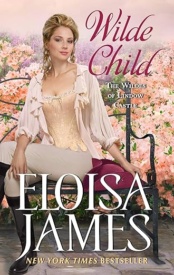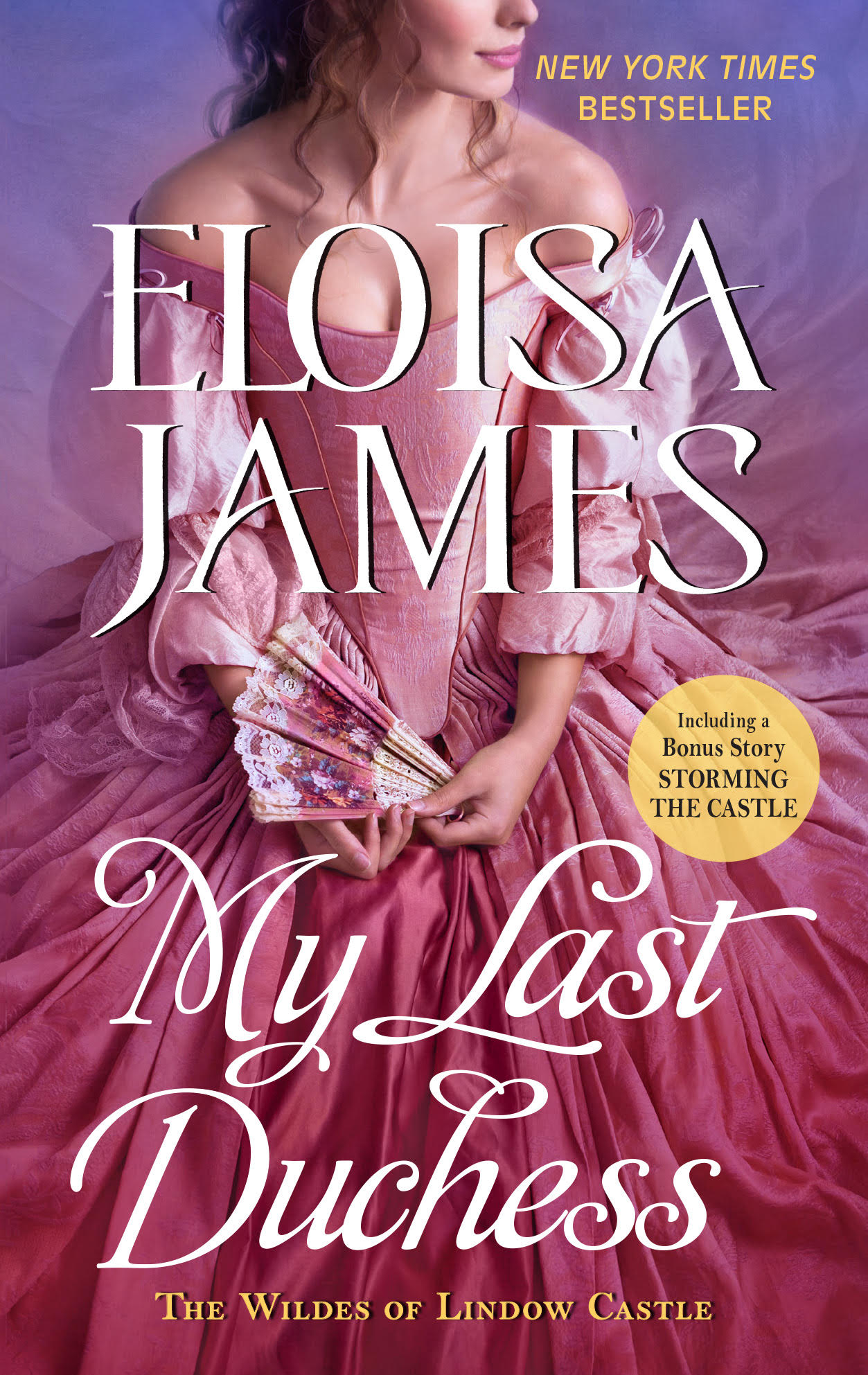Wilde in Love
Book 1 in the Wildes of Lindow Castle Series
Lord Alaric Wilde, son of the Duke of Lindow, is the most celebrated man in England, revered for his dangerous adventures and rakish good looks.
Arriving home from years abroad, he has no idea of his own celebrity until his boat is met by mobs of screaming ladies. Alaric escapes to his father’s castle, but just as he grasps that he’s not only famous but notorious, he encounters the very private, very witty, Miss Willa Ffynche.
Willa presents the façade of a serene young lady to the world. Her love of books and bawdy jokes is purely for the delight of her intimate friends. She wants nothing to do with a man whose private life is splashed over every newspaper.
Alaric has never met a woman he wanted for his own…until he meets Willa. He’s never lost a battle.
But a spirited woman like Willa isn’t going to make it easy…
The first book in Eloisa James’s dazzling new series set in the Georgian period glows with her trademark wit and sexy charm—and introduces a large, eccentric family. Readers will love the Wildes of Lindow Castle!

Wilde in Love
Book Extras

Inside Wilde in Love
I gave more time in this novel to Alaric’s family, because his siblings are an integral part of the world of the Wildes of Lindow Castle series. I got tired of heroes who walk alone through the world. Alaric has many people who love him. And just as it might in real life, the loss of his elder brother Horatius had a tremendous effect on him.

Eloisa Reads from Wilde in Love
Join Eloisa from her cozy apartment as she reads from the very beginning of Wilde in Love.

Mea Culpa, Wilde in Love
Victoria wrote me to point out that in Chapter 25, Edinburgh is spelled Edinborough rather than Edinburgh, “English not being pronounced as it is spelt I’m afraid.”
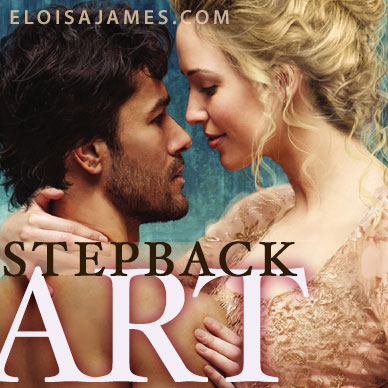
Wilde in Love’s Gorgeous Stepback!
Team Eloisa loves the stepback for Wilde in Love!

The Wilde Family Tree
Learn who’s who in the Wilde Family.

Wilde in Love
Reviews
"charming, romantic, and unexpectedly funny."
"The romance between them builds gradually and realistically, and intensifies through their exchanges of witty repartee and sensual innuendo."
"This laugh-out-loud love story has heart and emotional depth that readers crave and pure romance that has us sighing."
— RT BookReview (top pick!)
"Wilde in Love delivers heavy doses of charm..."
"Plenty of wry wit, graced with a brilliantly crafted cast of characters, and imbued with just the right amount of luscious sensuality..."
— Booklist (starred review)
"Wilde in Love gives readers a lovely romance and a fine introduction to a series that I cannot wait to keep reading."
"Glows with her trademark wit and sexy charm."
Wilde in Love
Enjoy an Excerpt
Jump to Ordering Options ↓
Listen to an Audio Excerpt ↓
Chapter One 
June 25, 1778
London
There wasn’t a person in all England who’d have believed the boy who grew up to be Lord Alaric Wilde would become famous.
Infamous? That was a possibility.
His own father had given him that label after Alaric was sent down from Eton at the age of eleven for regaling his classmates with stories of pirates.
Piracy wasn’t the problem—the problem was the uncanny way young Alaric had depicted his small-minded Etonian instructors in the guise of drunken sailors. These days he avoided portraying self-righteous Englishmen, but the impulse to observe had never left him. He watched and summarized, whether he was in China or an African jungle.
He had always written down what he saw. His Lord Wilde books were a consequence of that impulse to record his observations, a drive that appeared as soon as he learned to write his first sentences.
Like everyone else, it had never occurred to him that those books could make him famous. And he didn’t think any differently when he rolled out of his berth on the Royal George. All he knew in that moment was that he was finally ready to see his family, all eight siblings, not to mention the duke and duchess.
He’d stayed away for years, as if not seeing his eldest brother Horatius’s grave would make his death not true.
But it was time to go home.
He wanted a cup of tea. A steaming hot bath in a real bathtub. A lungful of smoky London air.
Hell, he even missed the peaty smell that hung over Lindow Moss, the bog that stretched for miles to the east of his father’s castle.
He was drawing back the curtain over the porthole when the ship’s boy knocked and entered. “There’s a mighty fog, milord, but we’re well up the Thames, and the captain reckons we’ll be at Billingsgate Wharf any minute.” His eyes shone with excitement.
Up on deck, Alaric found Captain Barsley standing in the prow of the Royal George, hands on his hips. Alaric started toward him and stopped, astonished. Through the fog, the dock glimmered like a child’s toy: a blurry mass of pink, purple, and bright blue that separated into parts as the ship neared the pier.
Women.
The dock was crowded with women—or, more precisely, ladies, considering all the high plumes and parasols waving in the air. A grin tugged at the corners of Alaric’s mouth as he joined the captain.
“What in the devil is going on?”
“I expect they’re waiting for a prince or some such foolishness. Those passenger lists they print in the Morning Chronicle are utter rubbish. They’re going to be bloody disappointed when they realize the Royal George hasn’t a drop of royal blood aboard,” the captain grumbled.
Alaric, who was related to the crown through his grandfather, gave a shout of laughter. “You have a noble nose, Barsley. Perhaps they’ve discovered a relation you never heard of.”
Barsley just grunted. They were close enough now to discern that ladies were crowded as far back as the fish market. They appeared to be bobbing up and down like colored buoys, as they strained to see through the fog. Faint screams suggested excitement, if not hysteria.
“This is Bedlam,” Barsley said with disgust. “How are we supposed to disembark in the midst of that?”
“Since we’ve come from Moscow, perhaps they think the Russian ambassador is onboard,” Alaric said, watching a rowboat set out toward them, manned by a dockworker.
“Why in the devil’s name would a flock of women come looking for a Russian?”
“Kochubey is a good-looking fellow,” Alaric said, as the boat struck the side of the ship with a thump. “He complained of English ladies besieging him, calling him Adonis, and sneaking into his bedchamber at night.”
But the captain wasn’t listening. “What the devil are those women doing on the wharf?” Captain Barsley roared, as the dockworker clambered over the side from the rowboat. “Make way for my gangplank, or I won’t be responsible for the fish having a fine meal!”
The man dropped to the deck, eyes round. “It’s true! You’re here!” he blurted out.
“Of course I’m here,” the captain snarled.
But the man wasn’t looking at Barsley.
He was looking at Alaric.

Chapter Two
Cavendish Square
London
Miss Wilhelmina Everett Ffynche was engaged in her favorite activity: reading. She was curled up in an armchair, tearing through Pliny’s eyewitness account of the eruption of Mount Vesuvius.
It was just the kind of narrative she most loved: honest and measured, allowing the reader to use her own imagination, rather than ladling on sensational detail. His description of seeing a cloud of smoke shaped like an umbrella spreading ever higher and wider was fascinating.
The door burst open. “Madame Legrand delivered my new bonnet!” her friend Lavinia cried. “What do you think?”
Willa plucked off her spectacles and looked up as Lavinia spun in a circle. “Absolutely perfect. The black plume was a stroke of genius.”
“I fancy it adds gravitas,” Lavinia said happily. “Making me look dignified, if not philosophical. Like you in your spectacles!”
“I only wish my spectacles were as charming as your plume,” Willa said, laughing.
“What are you reading about now?” Lavinia asked, dropping onto the arm of Willa’s chair.
“Pliny’s account of the eruption that buried Pompeii. Just imagine: his uncle headed directly into the smoke, determined to rescue survivors. And he wanted Pliny to go with him.”
“Lord Wilde would have gone straight to the disaster as well,” Lavinia said with a look of dreamy infatuation.
Willa rolled her eyes. “Then he would have perished, just as Pliny’s uncle did. I must say, Wilde sounds like just the type to run straight at danger.”
“But he’d be running toward danger in order to save people,” Lavinia pointed out. “You can’t criticize that.” She was used to Willa’s scoffing at the explorer whom she claimed to love above all else.
Except new hats.
And Willa.
“I am so happy my bonnet came in time for the house party at Lindow Castle,” she said, “which reminds me that the trunks are stowed and Mother would like to leave after luncheon.”
“Of course!” Willa jumped to her feet and tucked her spectacles and book into a small traveling bag.
“I am looking forward to seeing Lord Wilde’s childhood home,” Lavinia said, with a happy sigh. “I mean to sneak up to the nursery as soon as I can.”
“Why?” Willa inquired. “Are you planning to take a keepsake? A toy he once played with, perhaps?”
“The gardeners can’t keep the flowerbeds at the castle intact,” Lavinia said with a giggle. “People want to press flowers between the pages of his books.”
Willa could scarcely imagine the chaos if Lord Wilde himself made an appearance, but the man hadn’t been seen in England for years. If you believed the popular prints, he was too busy wrestling giant squid and fighting pirates.
Sometimes Willa felt as if a fever had swept the kingdom—or at least the female half of it—leaving her unscathed.
During the Season that just ended, young ladies had talked very little about the men whom they might well marry and spend a lifetime with, and a great deal about the author of books such as Wilde Sargasso Sea.
Wilde Sargasso Sea? Wilde Latitudes?
The only rational response was a snort.
Willa was fairly certain that in person, Lord Wilde would resemble every other man: likely to belch, smell of whiskey, and ogle a woman’s bosom on occasion.
She tucked her hand under Lavinia’s arm and brought her to her feet. “Let’s go, then. Off to Lindow Castle to burgle the nursery!”

Lindow Castle, Cheshire
Country seat of the Duke of Lindow
June 28, 1778
Late afternoon
Alaric walked down one of the long corridors of his childhood home, a deep feeling of satisfaction in his belly. His older brother, Lord Roland Northbridge Wilde—or North, as he preferred to be called—was at his side.
The heir and the spare. The courtier and the explorer. The duke’s best beloved and the disgrace.
The infamous disgrace, it seemed.
He and North were of equal height, with similar features and cut of jaw. But the resemblances stopped there. Had they consciously tried, they couldn’t have been more different in personality.
“I did not bed the empress,” Alaric said once they had reached the bottom of the stairs. He stopped at the gilt-encrusted mirror hanging in the castle entry to slap a battered, powdered wig on his head and then grimaced at his reflection. “Maybe I should change my mind and return to the Russian court. At least I wouldn’t have to wear this monstrosity.”
“Seriously, there’s no truth to the rumor?” North persisted, coming up at Alaric’s shoulder. “Joseph Johnson is selling a print entitled England Takes Russia by Storm. It’s set in Empress Catherine’s bedchamber, and the fellow looks remarkably like you.”
Their eyes met in the glass, and North visibly recoiled. “Good God, is that your only wig?” He frowned at the lumpy mound on Alaric’s head. “Father won’t like to see that at dinner. Hell, I don’t like it.”
That wasn’t surprising. North was wearing a snowy towering creation that turned him into a cross between a parrot dipped in plaster dust and a fancy chicken. Alaric hadn’t seen his brother in five years, and he’d scarcely recognized the man.
“I came straight from the dock, but I sent my valet into London. Quarles should arrive in a few days, new wig in hand, although his acquisition won’t come close to the elegance of yours.”
North adjusted his cuffs. Pink silk cuffs. “Obviously not, since this wig is Parisian, enhanced by Sharp’s best Cyprus hair powder.”
Just then the family butler, Prism, came into the entrance hall. He was the sort of butler who firmly believed that the aristocracy could do no wrong. Butlering for the Wildes offered constant assaults to this conviction, but he was wondrously able to dismiss evidence to the contrary.
“Good afternoon, Lord Roland, Lord Alaric,” he said. “May I be of service?”
“Afternoon, Prism,” Alaric said. “My brother is determined to disrupt the duchess’s tea by introducing me to his fiancée.”
“The ladies will be shocked and delighted,” Prism said with a cough that managed to convey his dismay at Alaric’s unexpected fame.
“I’m as baffled as you are,” Alaric told him. He had escaped the crowd on the wharf by throwing on Captain Barsley’s hat. None of the women shrieking his name recognized him as he made his way through the crowd, which made the experience all the stranger.
“Give me a minute,” North said, adjusting his elaborately tied cravat in the glass. “Brace yourself, Alaric. I suspect every woman in that room has at least one print depicting your adventures.”
“The duke says that in the years since I left England they’ve littered the entire country. Actually, I think the word he used was ‘defiled.’”
“The way people gossip about you, not to mention collecting portraits, does not please our father. He thinks your celebrity is ill-becoming to our rank. Do you remember Lady Helena Biddle? Supposedly she’s papered her house in prints of you, so she might faint when you walk in.”
Alaric bit back an oath. Helena Biddle had already been in pursuit of him five years ago.
“She’s widowed now,” his brother added, starting to tweak the curls that hung over his ears.
At this rate, they’d be here for an hour. “I’m looking forward to meeting your fiancée,” Alaric prompted.
North had the trick of looking severe no matter his mood, but now his mouth eased. “Just look for the most beautiful, elegant woman in the room.”
Who cared if North had transformed into a peacock in the years Alaric had been away? His older brother had clearly fallen in love.
Alaric gave North a rough, one-armed hug that risked the perfection of his brother’s neckcloth. “I’m happy for you. Now stop fiddling with your wig, and introduce me to this lovely creature.”
Prism threw open the great doors leading to the green salon, where the female half of the duke’s house party had gathered for tea. The room before them was crowded with things that Alaric loathed: silks, wigs, diamonds—and insipid faces.
He loved women, but aristocratic ladies, bred to giggle and talk of nothing but fashion?
No.
There were twenty assorted gentlewomen in the room, including his stepmother, the duchess, but North’s gaze went directly to a lady whose overskirt was bunched into no fewer than three large puffs. Other women’s arses were adorned with puffs, but this woman’s puffs were larger than anyone else’s.
It seemed the bigger your bum, the more fashionable you were.
“That is she,” North said in a low voice. He sounded as if he had caught a glimpse of some royal being.
If sheer volume of attire were indicative of rank, Miss Belgrave would certainly be fit for a throne. Her petticoat had more bows, her open gown more ruffles. And she wore an entire basket of fruit on top of her head.
Alaric’s brows drew together. Could his brother really intend to marry a woman like that?
“Lord Roland… and Lord Alaric,” Prism announced.
The ladies registered his presence with an audible gasp. Alaric’s jaw clenched. He turned to his brother. “Billiards after?”
North winked. “I’m always happy to take your money.”
With no help for it, Alaric entered the room.
Thankfully, Willa happened to be facing the door when the great explorer was announced, which meant she didn’t shame herself by spilling her tea as she swung about—as did almost every other woman in the room.
Willa could hardly blame them. Lord Wilde’s image smoldered from bedchamber walls all over the country, and yet no one ever expected to meet him. Confronted by the real man, the lady to her right clapped her hand to her bosom and looked as if she might faint.
It was positively tragic that Lavinia was late for tea; she’d be furious with herself for dawdling once she heard the news.
The man who strode into their midst, looking neither left nor right, was wearing sturdy boots rather than the slippers commonly worn by gentlemen indoors.
He had no rings, no curls to his wig, and no polish.
Willa snapped open her fan, the better to examine this paragon of masculinity, as The Morning Post had called him. He certainly wasn’t a paragon of fashion.
He looked as if he would have been at home in another century—the Middle Ages perhaps, when gentlemen fought with broadswords. Instead he was stuck in a time when gentlemen’s toes were often rendered invisible by the floppy roses attached to their slippers.
At that moment, the silence that had gripped the room broke and there was a swell of chatter and more than one squeal.
“I see his scar!” someone behind her yelped.
Only then did Willa notice the thin white line snaking down one sun-browned cheek in a manner that should be objectionable but somehow wasn’t.
There were many stories about how he’d acquired that scar, but Willa’s guess had always been that Lord Alaric fell in a privy and knocked his head against a corner.
Lavinia’s distant cousin, Diana Belgrave—Lord Alaric’s future sister-in-law—had been moodily staring out the window at the gardens. Now she scurried over, positioning herself with her back to the room. “Do you think Lord Roland caught sight of me?” she hissed.
The two brothers kissed their stepmother’s hand, and…
Turned directly toward them.
Willa almost sighed, except she’d made a rule years ago that Wilhelmina Everett Ffynche never sighed. But if there ever was a situation that called for a sigh, it was when a young lady—Diana, for example—was so dismayed by her future husband that she would do anything to avoid his company.
“Yes, he has,” she stated. “Turning your back is no disguise when your wig is taller than anyone else’s. They’re headed this way like homing pigeons to a roost.”
Watching them approach, Willa suddenly understood for the first time why prints of Lord Wilde adorned so many bedchamber walls. There was something shocking about him.
He was so big and—and vital in a primitive way.
Which would be an uncomfortable quality to live with, she reminded herself. She possessed only an engraving of Socrates: a thoughtful, intelligent man whose thighs were doubtless as slim as her own.
“Willa, I beg you to do the talking,” Diana whispered. “I already endured an exchange with Lord Roland at the breakfast table.”
Her fiancé reached them before Willa could answer. “Miss Belgrave, may I present my brother, Lord Alaric, who has just returned from Russia?” he asked Diana.
While Diana demonstrated her remarkable ability to curtsy while balancing half a greengrocer’s stall on her head, Willa discovered that Lord Alaric had sculpted cheekbones, lips that wouldn’t shame an Italian courtesan, blue eyes . . .
Oh, and a straight nose.
Those portraits of him that could be found in every printshop?
They didn’t do him justice.
He bowed before Diana with surprising finesse, given the breadth of his chest. His coat strained over the shoulders. One might think that a body so defined by muscle would find it hard to bend.
One might also think that a duke’s son would employ a better tailor.
“It is a pleasure to meet you, Miss Belgrave,” he said, kissing Diana’s hand. “I am honored to welcome you to our family.”
Diana managed a wan smile.
Willa almost stepped backward as Lord Roland turned to her. Lord Alaric was so large that she had the absurd feeling that he might be swallowing up the air around them.
At least that would explain her slight feeling of breathlessness.
Lord Roland was eager to converse with his future spouse, and promptly drew her aside for a tête-à-tête, which left Willa alone with the explorer. “Lord Alaric, it is a pleasure,” she said, holding out her hand to be kissed.
The elite seminary she had attended had excelled at teaching the protocol of awkward social situations. In this case, it meant that Willa pretended that the circle of ladies behind her, breathlessly awaiting the same experience, did not exist.
Interestingly, Lord Alaric appeared to be paying no attention to them either. As he brought her hand to his lips, the smile in his eyes seemed to be for her alone. “I’d say the pleasure is all mine,” he murmured.
His voice was deep and husky, as unusual as his costume. It wasn’t the voice of a courtier. Or of a boy, as were many of her suitors. It was the voice of a grown man.
Instead of kissing the back of her hand, he raised her curled fingers to his mouth, and their eyes met as his lips touched them.
She wasn’t wearing gloves, but that didn’t explain the way her skin prickled to life. Willa felt her lips curling into a smile entirely unlike the calm expression with which she usually greeted a stranger.
“I understand that you have just returned to England,” she said, hastily withdrawing her hand. “What do you miss when you are traveling abroad?”
Lord Alaric’s eyes, fringed by thick eyelashes, were the blue color of the sky at twilight.
Beauty was an accident of birth. But eyes? That was different. Beautiful eyes had feeling in them.
“I miss my family,” he said. “After that, mattresses without lice, brandy, welcoming servants, an excellent plate of ham and eggs in the morning. Oh, and the company of ladies.”
“It must be intoxicating to be so adored,” Willa said, nettled by the way he ranked ladies below a plate of ham.
Lord Alaric’s mouth quirked into a wry smile. “Adoration is a bit strong. I think myself lucky that my readers find something to enjoy in my work.”
She let a trace of scorn shine from her eyes because… false modesty? Ugh. “I enjoyed reading Montaigne’s essay on cannibals, but that didn’t spur me to hang his image in my room.”
He looked faintly surprised. Did no one ever disagree with him? Or was he not aware that his image was enshrined in so many bedchambers?
“Where do you plan to travel next?” she asked, changing the subject.
“I haven’t decided. Do you have a suggestion?”
“I am not certain where you’ve already been,” Willa admitted. “I’m afraid that I’m one of the few people in the kingdom ignorant on the subject of Lord Wilde’s peregrinations.”
His heavy-lidded eyes opened slightly, the tilt of his mouth hitching up a bit more. “A large word for an inconsequential subject. I assure you that you aren’t alone in avoiding my books.”
Willa would really have liked to shrug, but shrugging was like sighing: an inelegant way to indicate an emotion better kept to oneself. “There’s little evidence for that,” she pointed out. “You have been away for some time, but you’ll find that your work is read widely.”
“Do you prefer novels?” he asked.
“No, I’m afraid I’m not attracted to invented stories of any kind,” Willa said. His eyes were so intent on her face that she was beginning to feel slightly dizzy.
Annoying man.
“I do not invent the events I describe,” Lord Alaric said, a thread of laughter in his voice.
“Certainly not,” she said hastily. Then, unable to resist, “Although, from what my friend Lavinia has told me, wouldn’t you agree that your adventures tend to be, shall we say, larger than life?”
“No,” he replied, seemingly even more amused. “What are you reading at the moment?”
“Pliny’s letters to Tacitus, but I’ll put it to the side and read one of your accounts. Where would you recommend that I start? With the cannibals, perhaps?”
One of his brows shot upward. “Cannibals?”
“Oh, that’s right,” Willa exclaimed. “Lavinia told me that cannibals appear only in the play.”
Like a dot on the end of a sentence, that put an end to his amusement. His brows drew together. “Play?”
“Wilde in Love,” Willa answered, astonished that Lord Alaric knew nothing of the hugely successful play depicting his life.
“I presume the spelling of that title includes an ‘E’.” He did not look happy. “Exactly what happens in Wilde in Love?”
“As you might have guessed, you meet a lady,” Willa said, rather enjoying watching his pained expression deepen.
Lord Roland startled her by clearing his throat. It seemed Diana had fled, leaving Lord Alaric’s brother to rejoin them. “I forgot to tell you,” he said, giving his brother a mischievous grin. “A group of us made a special trip to London to see your play, Alaric. Aunt Knowe bought up every single locket they had for sale outside the theater.”
Lord Alaric frowned.
“Reproductions of the locket you gave your fiancée,” Willa explained.
“I not only fall in love, but become betrothed?”
“She was your one true love,” Lord Roland said, his smile growing ever wider. “You wrote and recited a great deal of love poetry—that took up most of the first act—and finally handed over a locket as a sign of your devotion. You’re sure to see ladies wearing them; yesterday Aunt Knowe was handing them out like gingerbread men.”
“What utter hogwash. I’ve never had a fiancée nor written a scrap of poetry. What else happens in this farce?”
“I’m sorry to say that it’s not a farce but a tragedy, since cannibals eventually make a meal of your beloved,” Willa said, unable to stop herself from smiling along with Lord Roland.
“I can’t say that I feel very sad on hearing of the death of the fiancée I never met,” Lord Alaric observed.
“If you don’t mind the advice,” his brother said irrepressibly, “you should have skipped breakfast and overcome your fear of water in time to save the missionary’s daughter from the cannibals.”
Lord Alaric’s body stilled. “Just what do you mean by ‘missionary’s daughter’?”
Willa reflexively moved back a step. All of a sudden he reminded her of a predator on the verge of pouncing. Not that anyone else seemed to notice.
The moment Willa broke their little circle, the gathering of impatient ladies at her back surged forward, elbowing her to the side.
She ought to leave without a backward look, and began to do just that, but halfway across the room, she turned, only to find, embarrassingly, that Lord Alaric was watching her.
Presumably he was accustomed to ladies throwing longing glances over their shoulders, because one side of his mouth curled up as their eyes met.
Was he mocking her for retreating?
Willa snapped her head about. He couldn’t have made it clearer that he paid no attention to the rules of civility that dictated well-bred behavior.
The man was a menace to polite society.
An appealing menace, but a menace all the same.

Chapter Three
The billiards room
Early evening
I don’t remember ever seeing you in silk, let alone pink silk,” Alaric said. He was leaning against the billiards table, watching his brother pocket the red ball over and over with careless mastery. “If you’re not careful, you’ll turn dukish. Remember Horatius?”
When he was alive, their older brother Horatius had relished the nonsense of being heir to a dukedom. He had already been pompous in short pants. Hell, probably even in nappies.
“‘Dukish’ isn’t a word, and this is what an English nobleman wears,” North said flatly. “Now you’re back in England, you’ll have to dress to your station.”
“I shaved,” Alaric observed.
North slammed his white cue ball into the red ball, which dropped into a pocket yet again. “It could be that the air around a future duke is poisoned. I’ll admit that I astonish myself sometimes.”
“Isn’t it my turn yet?” Alaric took a healthy slug of French brandy.
“No.”
“I’ve decided that your wig makes you look like an African parrot crossed with a fancy chicken.”
North flipped his cue, using the slender end to carom his cue ball off one rail, then another, and finally into the chosen red ball—which surprisingly failed to pocket. “Horatius died. I had to grow up.”
Alaric pushed away a familiar pang of sadness. “You have three curls over each ear,” he pointed out. “Add them to the pretty ruffles at your wrists and the coat tarted up with gold embroidery, and the result cannot be explained by maturity alone.”
“You can’t imagine how uninteresting I find your sartorial commentary,” North said. “Since you are preoccupied by my wardrobe, shall I take the next round?”
“Go ahead,” Alaric said, taking another swallow. “It isn’t just your wardrobe. When I left five years ago, you were wig-free, with a plump dancer in one pocket and a sulky Italian singer in the other. And now you’re getting married.”
North leaned to position his cue. “People change.”
“You’re wearing heels,” Alaric said, catching sight of his brother’s feet. “Damn it, they aren’t even black, are they?” He bent down and said, with some revulsion, “North, your stockings are striped, and your heels are yellow. Yellow.”
“This is the newest style. You left in 1773, and it’s 1778. Fashions change.” He sank the red ball.
“You’ve turned into a damn fop. I wouldn’t be surprised if you start wearing great silver buckles on your shoes.”
His brother straightened. “Alaric.” His voice was dangerously quiet, a tone that in their childhood days would be followed by an attempt to pound his brothers into the floor.
But Alaric had never been able to stop himself from poking the beast—in this case, the man who scarcely resembled the brother he remembered. “Should I steel myself to watch you mince down the aisle in scarlet heels? Wearing rouge, no doubt, and patches?”
North narrowed the dark blue eyes that were uncannily similar to Alaric’s own. “Should I assume that you will look like a blacksmith in the church? Because you do at the moment.”
“Quarles would be very wounded to hear that,” Alaric said. His valet did his best, inasmuch as his master refused to wear silk, heels, ruffles, or rouge.
Their family was large by any standard—their father’s third wife was on the verge of giving birth to yet another little Wilde—but Horatius, he, and North had been the first three in the nursery.
He would have said that they knew each other inside out: Horatius had been arrogant, but true; Alaric was adventuresome, verging on foolhardy; North was rakish and half-mad.
Rakish and mad were nowhere in evidence now. In their place: Prissy. Fashionable. Flowery. Soon to be married.
It was hard to believe.
Impossible.
“What is Miss Belgrave’s given name?” Alaric asked. He’d scarcely managed to speak to his future sister-in-law. For one thing, he’d been distracted by that fiery little termagant who hadn’t read his books.
Damn, she was lovely, though. Delicate features paired with plump lips that curved in a way that made a man instinctively think about bedding her—even though her mouth had been crooked in a sardonic little smile, because she had obviously decided that he was a storyteller at best, and a fribble at worst.
A deceitful fribble, at that: one who created the events in Lord Wilde’s books from thin air.
Never mind her smirk: when he was looking at her, he understood the whole wig business.
A wig kept a woman’s hair to herself—and her lover. Made it a private delight.
Then, just when he’d learned about that absurd play, he’d been mowed down by ladies who had seen Wilde in Love and seemed to believe that his life actually bore some resemblance to that rubbishing play.
“My fiancée’s name is Diana,” North replied, smiling. It was an involuntary smile that lit up his eyes.
“Diana? Hell, she’s practically already part of the family,” Alaric said, shaking off thoughts of Wilde in Love.
Their father had named all his children after warriors; Alaric and Roland used to stage battles between Alaric, king of the Visigoths, and Roland, chief paladin to King Charlemagne. Horatius had been too lofty for such childish games; as he liked to remind them, his namesake had fought an entire army on his own.
“I told the duchess that she couldn’t have the name for the new baby,” North said.
“They’ll run out of appropriate names soon.” Alaric counted off the names. “There’s you and I and Horatius from Mother. Leonidas, Boadicea, Alexander, and Joan from the second duchess. The third has given us Spartacus, Erik, and whoever the next one will be.”
“Don’t forget Viola,” North said. Viola was the current duchess’s daughter from her first marriage. Their father had met his third wife a few years after she was widowed.
“Viola doesn’t have a warrior’s name because our father wasn’t around to name her. My point is that Diana will fit right in. Tell me about her.”
“You saw how beautiful she is,” North said, his face softening. “She’s one of the most fashionable ladies in London. She’s bringing a substantial dowry to the estate.”
“We don’t need it,” Alaric said. “Unless things have changed?”
“They haven’t, but money is always useful.”
“True. What are her interests?”
His brother looked blank.
“Besides fashion,” Alaric prompted. “Is she interesting?”
“I don’t need, or want, an interesting wife,” North said, plucking the red ball out of the pocket. “In fact, I think an interesting wife is anathema to a man like me.”
“‘A man like you,’” Alaric repeated. “Exactly what kind of man have you become, North?”
His brother’s mouth tightened into a thin line. “You may be able to racket around the world, calling yourself Lord Wilde, chasing pygmy tribes and wild elephants, but I cannot. The estate takes a great deal of work: our father has just acquired a sixth property, in Wales.”
“I didn’t know you needed me,” Alaric said, feeling as if he’d taken a blow to the stomach.
“I don’t,” North said immediately. “I don’t give a damn whether you’ve been roasting in Africa or freezing in Saint Petersburg.”
But clearly he had. He did.
Damn it.
Alaric put down his glass. “I apologize for staying away so long, and for leaving you with the care of my estate on top of the rest.”
“On that front, I meant to tell you that I hired a few men to guard your house, but people keep sneaking up and prying out bricks.”
“What the hell for?”
“Keepsakes,” North said with a shrug. “Mementos of their love. Damned if I know.”
Alaric swallowed back a curse. A tall hedge would keep them out. Maybe a hedge and a few wolfhounds for good measure.
“There’s quite a trade in Wilde memorabilia,” his brother continued, “so I suppose some of the bricks make their way to London.”
“That bloody play,” Alaric said with disgust. “I have to get it shut down.” Yet he couldn’t leave for London immediately, given his long absence. His father had asked him to remain at Lindow Castle for a few weeks, at least until the birth of his new sibling.
“I don’t think it’s against the law to write a play about someone’s life. Wilde in Love is everything you’d expect: melodramatic, ridiculous, a lot of fun. Tickets have been sold ahead for months.”
“It’s one thing if a play’s about Julius Caesar,” Alaric pointed out. “I’m alive. How would you like a bunch of nonsense up on the stage about you?”
“You’re the one who wrote books about yourself,” North retorted.
“I wrote books. I didn’t write a play. The books are accurate, whereas I have had nothing to do with cannibals.” Alaric threw the last of his brandy down his throat, welcoming the burn.
The missionary’s daughter had to be a lucky guess. He could imagine a playwright deciding to make a penny by dramatizing spurious adventures under the insipid title Wilde in Love. But how in the hell did that hack know to include a missionary’s daughter?
It was actually thanks to the only missionary’s daughter he’d ever met, Miss Prudence Larkin— who had loved him, though the feeling was not returned—that he stayed far away from virtuous young ladies. In fact, he vaguely put ladies and cannibals in the same category: ravenous beings with a taste for Englishmen.
But neither the play nor his thieving readers were as important as North’s earlier revelation. “I am sorry that I left you with the care of my estate.” His jaw tightened. “It was easier to board another ship than to come home and imagine Horatius losing his life in the bog.” He dipped his head in the direction of Lindow Moss, the huge stretch of wetlands east of the castle.
“Did you think that you were alone in that feeling? We all miss Horatius. But we missed you as well.” North’s cue ball thumped into the table’s cushion, spun, and narrowly missed a pocket. “I actually read your last book, not because I’m one of your throngs of admirers, but so that I had some idea what my brother was doing and where he’d been.”
“I apologize,” Alaric said. He raked his hand through his hair again. “Hell and damnation. I’m truly sorry.”
“Horatius would have loved your latest book. He would have been bloody proud of you. Probably dragged us to that play every night of the week.” North slammed his ball so hard that it skipped the rail and rolled across the floor.
“Your turn,” he said, looking up.
In more ways than one, it seemed.
end of excerpt
Wilde in Love
by Eloisa James
is available in the following formats:
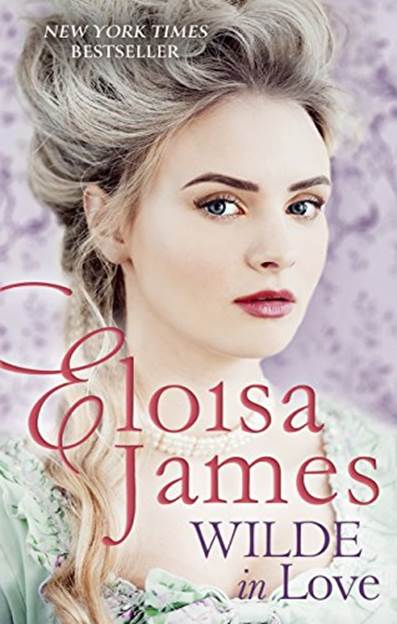
UK Print:
UK Digital:
→ As an Amazon Associate I earn from qualifying purchases. I also may use affiliate links elsewhere in my site.





